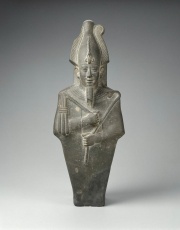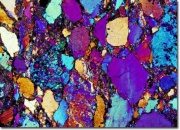Difference between revisions of "Greywacke"
Jump to navigation
Jump to search
(username removed) |
|||
| (3 intermediate revisions by 3 users not shown) | |||
| Line 1: | Line 1: | ||
| − | [[File:29.1131-SC36593.jpg|thumb|]] | + | [[File:29.1131-SC36593.jpg|thumb|Statue of Osiris<br>MFA# 29.1131]] |
== Description == | == Description == | ||
| − | A British term for a fine-grain, hard sedimentary stone found in Wales and other locations. Greywacke is a gray to blackish stone. It contains particles of quartz or clay cemented with [ | + | A British term for a fine-grain, hard sedimentary stone found in Wales and other locations. Greywacke is a gray to blackish stone. It contains particles of quartz or clay cemented with [[chlorite]], [[mica]], [[epidote]], and [[calcite]]. Greywacke is similar in composition to siltstone, but the particles are larger ranging in size from 0.06 - 0.2 millimeters (Aston et al 2000). The tiny grains are barely visible to the naked eye. Greywacke does not have the pronounced layering of [[shale]] and [[schist]]. Greywacke has been used for statuary and sarcophagi. |
[[File:graywrackelarge.jpg|thumb|Greywacke]] | [[File:graywrackelarge.jpg|thumb|Greywacke]] | ||
| + | |||
== Synonyms and Related Terms == | == Synonyms and Related Terms == | ||
graywacke; schist; dirty sandstone; Grauwacke (Deut.); grauwacke (Fr., Ned.); grauvaque (Port.); | graywacke; schist; dirty sandstone; Grauwacke (Deut.); grauwacke (Fr., Ned.); grauvaque (Port.); | ||
| − | == | + | ==Physical and Chemical Properties== |
Particle size 0.06 - 0.2 mm | Particle size 0.06 - 0.2 mm | ||
| − | == | + | ==Resources and Citations== |
| − | |||
| − | |||
| − | + | * B.Aston, J.Harrell, I.Shaw, "Stone" in ''Ancient Egyptian Materials and Technology'', P.Nicholson, I.Shaw (eds.), Cambridge University Press, 2000, p. 57-58. | |
* ''Dictionary of Building Preservation'', Ward Bucher, ed., John Wiley & Sons, Inc., New York City, 1996 | * ''Dictionary of Building Preservation'', Ward Bucher, ed., John Wiley & Sons, Inc., New York City, 1996 | ||
| − | * Wikipedia | + | * Wikipedia: http://en.wikipedia.org/wiki/Greywacke (Accessed Nov. 2, 2005) |
* ''Van Nostrand's Scientific Encyclopedia'', Douglas M. Considine (ed.), Van Nostrand Reinhold, New York, 1976 | * ''Van Nostrand's Scientific Encyclopedia'', Douglas M. Considine (ed.), Van Nostrand Reinhold, New York, 1976 | ||
| − | * | + | * Random House, ''Webster's Encyclopedic Unabridged Dictionary of the English Language'', Grammercy Book, New York, 1997 |
* ''The American Heritage Dictionary'' or ''Encarta'', via Microsoft Bookshelf 98, Microsoft Corp., 1998 | * ''The American Heritage Dictionary'' or ''Encarta'', via Microsoft Bookshelf 98, Microsoft Corp., 1998 | ||
Latest revision as of 07:22, 9 August 2022
Description
A British term for a fine-grain, hard sedimentary stone found in Wales and other locations. Greywacke is a gray to blackish stone. It contains particles of quartz or clay cemented with Chlorite, Mica, Epidote, and Calcite. Greywacke is similar in composition to siltstone, but the particles are larger ranging in size from 0.06 - 0.2 millimeters (Aston et al 2000). The tiny grains are barely visible to the naked eye. Greywacke does not have the pronounced layering of Shale and Schist. Greywacke has been used for statuary and sarcophagi.
Synonyms and Related Terms
graywacke; schist; dirty sandstone; Grauwacke (Deut.); grauwacke (Fr., Ned.); grauvaque (Port.);
Physical and Chemical Properties
Particle size 0.06 - 0.2 mm
Resources and Citations
- B.Aston, J.Harrell, I.Shaw, "Stone" in Ancient Egyptian Materials and Technology, P.Nicholson, I.Shaw (eds.), Cambridge University Press, 2000, p. 57-58.
- Dictionary of Building Preservation, Ward Bucher, ed., John Wiley & Sons, Inc., New York City, 1996
- Wikipedia: http://en.wikipedia.org/wiki/Greywacke (Accessed Nov. 2, 2005)
- Van Nostrand's Scientific Encyclopedia, Douglas M. Considine (ed.), Van Nostrand Reinhold, New York, 1976
- Random House, Webster's Encyclopedic Unabridged Dictionary of the English Language, Grammercy Book, New York, 1997
- The American Heritage Dictionary or Encarta, via Microsoft Bookshelf 98, Microsoft Corp., 1998

